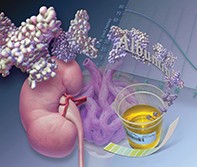Peer Reviewed
Feature Article Endocrinology and metabolism
The shifting paradigm of albuminuria in diabetic kidney disease
Abstract
Diabetic kidney disease has been traditionally thought of as being a linear progression from microalbuminuria to macroalbuminuria to renal failure. New emerging concepts have proved this to be incorrect and are changing the way diabetic kidney disease is considered.
Key Points
- Microalbuminuria may be transient and regress. This is more likely to occur if risk factors, such as blood glucose levels, blood pressure and lipid levels, are well controlled.
- Normoalbuminuric (nonclassical) diabetic kidney disease accounts for at least 25% of patients with chronic kidney disease (CKD) and diabetes.
- Although diabetic kidney disease is the most common cause of CKD in a patient with diabetes, other causes should be considered.
- Care of patients with diabetes requires careful attention to modifiable factors such as dyslipidaemia and hypertension, as well as good glycaemic control.
Picture credit: © Scott Bodell.
Purchase the PDF version of this article
Already a subscriber? Login here.

